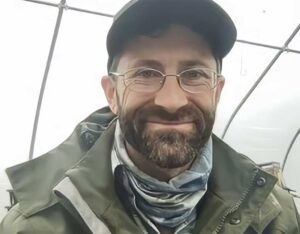
Max Budreau: We need new systems for growing local food
Every month, Liz Trice interviews a community member for The West End News. This month, she caught up with Max Budreau, the farmer that runs Winslow Farm in Falmouth.
What does your farm grow?

We grow mixed organic vegetables and small fruit, we have a farmstand, a flower nursery, and pick-your-own blueberries. We also do tours, workshops, and permaculture education on topics like no-till growing and perennial food systems.
How did you get into this?
I grew up on the farm. My parents bought it before I was born, so I got the basics from them. I studied human ecology and agroecology – the study of the ecological mechanisms of agriculture. I went into landscaping at first, but eventually transitioned to farm management and have now built the business over the last fifteen years. This is a unique place because of its location and proximity to Portland.
What are the challenges of small farms near urban areas?
There’s economic pressure, environmental pressure, social pressure… One of the biggest concerns is, how does a farmer make a living? There’s a high cost of living in Greater Portland… If you add up the hours, a farmer is making poverty wages. Does there have to be a personal sacrifice, or could there be a better balance of capital or community investment?
I would like to create food in the most ecologically sound manner. There are trade-offs. We have some greenhouses that are covered with plastic, but I think it outweighs the environmental cost of trucking food long distances in terms of carbon footprint. The cost of land is prohibitively expensive and the start up costs of the farm are very expensive for a new farmer. So it’s very hard for a new farmer to make it work. I’ve been very fortunate to be able to use this land.
If we wanted to address food systems as a statewide community, could we feed the population of Greater Portland on the land that’s available nearby?
There are only a small handful of farms growing food in Greater Portland, and they’re doing a great job, but it’s not possible to feed everyone. If we were to try to feed everyone, we’d have to shift how we utilize land. There is a lot of good land around, but the land use planning and zoning for Greater Portland has almost no set aside for farming, and most of the land is zoned for housing that is going to be large expensive homes that require driving.
Right now we don’t treat farmers as an important economic contributor – it seems like towns’ priorities are tax dollars and their social image. And even people in rural areas might be driving to Hannaford rather than walking over to the neighboring farm. It would also require more participation of the local labor force to produce enough food for everyone.
What would a sustainable future for farms in our communities look like?
My vision is that people participate in their food system, so that we can have a local sustainable food source. Sometimes the issue is lack of manpower. Right now the only people who can afford to work on farms are young and living at their parents’ home or already have sources of wealth or income from elsewhere. Farms can’t afford to pay people what they need to pay the full cost to live here.
So we could put aside more land and money for farming, or more people could spend more of their time growing food.
Yes, we could have a participatory CSA model, maybe you work five to ten hours per week. That could be a lot of labor. I’ve seen that on other farms. I have volunteers, but I’ve never made the work mandatory. It would be interesting to promote that conversation among people and farmers that are interested. Also, there’s an unfortunate situation where because farms are “for-profit” organizations, you’re not allowed to have volunteers, so you have to go through all the processes you have to do with regular employees.
But maybe you could get one hundred families and create a non-profit or cooperative CSA, where there’s a core group of facilitators, and everyone has to put in time. The most sustainable model would be people growing food in their own backyard.
What would you love for the future of yourself and your farm?
We’re working with Maine Farmland Trust to put this into permanent conservation and will be doing some tours. I have a vision for a sustainable model. I want a relationship with this farm, but I don’t want to be tied here and have to be here every day for the rest of my life! Maybe the buildings here could transition to an educational center, maybe some people could live here. It would be nice to have people living here that are excited about being close to fresh food, nature, and learning about land and food. The ideal model would be to have a core group of 12 or so full time people that would grow food for a community that’s directly surrounding the farm, probably one hundred or so families.
Currently we work through December, with December through February being much lighter workload. We’re slammed with work starting seedlings starting March 1st and are busy through the end of October, so we can’t use just teachers or students. Typically I’ve been able to keep people for 2-3 years, but people move on to other passions that pay better.
This interview was edited for clarity and brevity.





